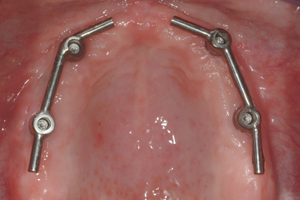Enough grip in the upper jaw to attach overdentures to four implants instead of six

Dentures that are fitted to dental implants in the upper jaw (also known as overdentures) can now be attached to four implants rather than six. This is the conclusion of dentist and implant specialist Wim Slot from the University Medical Centre Groningen, based on the medical benefits he found among patients who had been given four implants: the treatment was less time-consuming, cheaper and patients experienced fewer complications. The patients themselves were also more than satisfied with the results of the treatment. Slot will be awarded a PhD by the University of Groningen on 22 April 2013.
‘The decision to use six implants was originally made on pragmatic grounds, but we have now established that overdentures can be attached to 4 implants just as firmly,’ explains Slot. He thinks that other hospitals will start using fewer implants in the foreseeable future too.
Upper and lower jaw
In the Netherlands, 50% of people over the age of 50 have dentures. Most of them have dentures in both the upper and lower jaw. The lower jaw is known to shrink faster than the upper jaw, causing the dental prosthesis to become unstable. To prevent this, some 90% of people are already being given overdentures for the lower jaw. Overdentures for the upper jaw are less common; only 5% of people have them. Slot has recently noticed a rise in the number of patients asking for overdentures for the upper jaw. Healthcare insurers have to give prior permission.
Advantages
Slot verified the medical advantages of placing four implants rather than six. The procedure is less invasive as the oral surgeon does not need to go as far into the patient’s mouth, it leaves slightly more room between the implants and there is only a very remote risk that an implant in the upper jaw will come loose. ‘One of the main arguments in favour of six implants is the risk of losing one. If you only have four implants, you obviously don’t want to lose one of them,’ says Slot. However, as he has shown, this is such a rare occurrence that the argument no longer weighs up against the advantages of the less invasive procedure.
Prosthesis
Implants are placed by an oral surgeon, and a dentist and dental technician are then responsible for constructing the prosthesis. According to Slot, making overdentures for six implants is a trickier job than making them for four. He thinks that the lack of consultation between the professional groups has prevented them from looking for ways to improve the procedure. All patients in the UMCG are now given four implants instead of six. Slot expects more hospitals to follow suit and change their policy.
Curriculum Vitae
Wim Slot (Coevorden, 1960) works as a dentist/implant specialist at the Center for Dentistry and Oral Hygiene (CTM) in the University Medical Center Groningen (UMCG). He conducted his research in the Kolff Institute as part of the Maintaining Oral Health and Oral Function research project. Slot’s PhD supervisors are Prof. H.J.A. Meijer, Prof. G.M. Raghoebar and Prof. A. Vissink, and his thesis is entitled ‘Implant-supported maxillary overdentures.’
| Last modified: | 06 September 2021 1.54 p.m. |
More news
-
27 August 2024
UMCG gaat onderzoeksfaciliteiten beschikbaar stellen voor geneesmiddelenontwikkeling
Om de beschikbaarheid en effectiviteit van geneesmiddelen in Nederland te verbeteren gaat het UMCG het bedrijf G² Solutions opzetten. Dit bedrijf moet ervoor gaan zorgen dat belangrijke technologische ontwikkelingen op het gebied van DNA sequencing...
-
17 July 2024
Veni-grants for ten researchers
The Dutch Research Council (NWO) has awarded a Veni grant of up to €320,000 each to ten researchers of the University of Groningen and the UMCG. The Veni grants are designed for outstanding researchers who have recently gained a PhD.
-
16 July 2024
Medicine still subjects to male bias
Aranka Ballering studied the course of illness in people with common symptoms. One of the most striking findings to emerge from her research was that on average, women have a different – and less extensive – course of illness than men.
